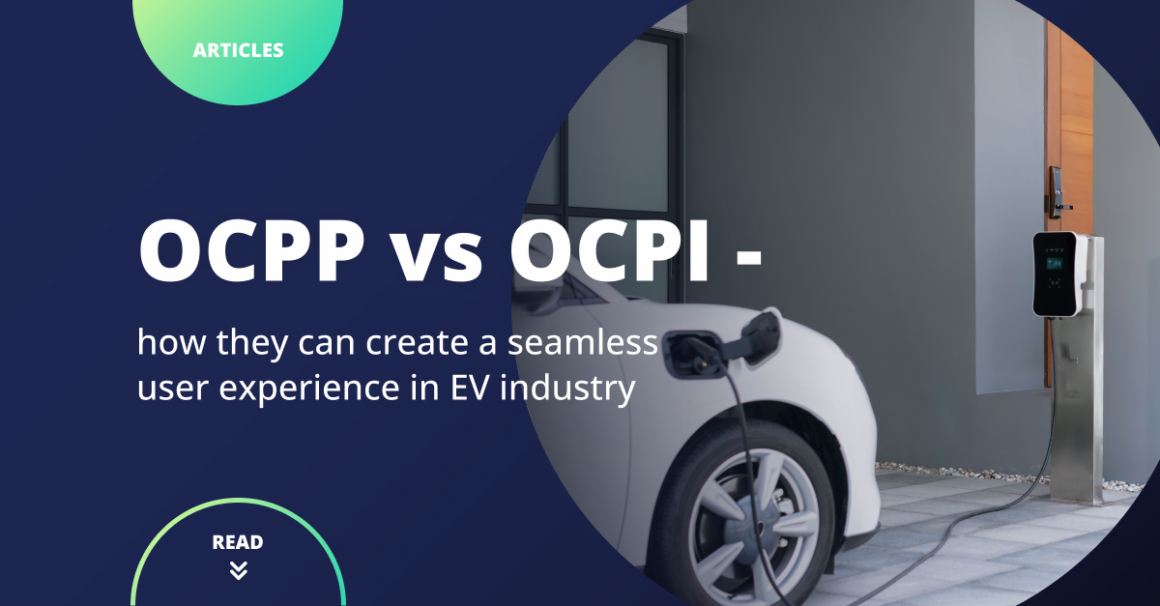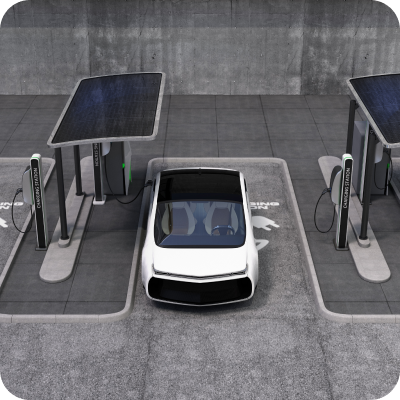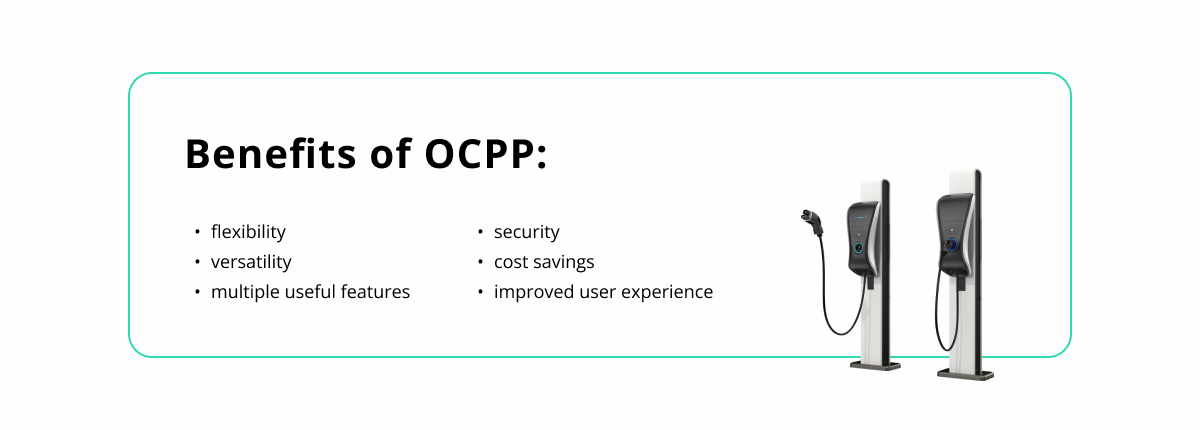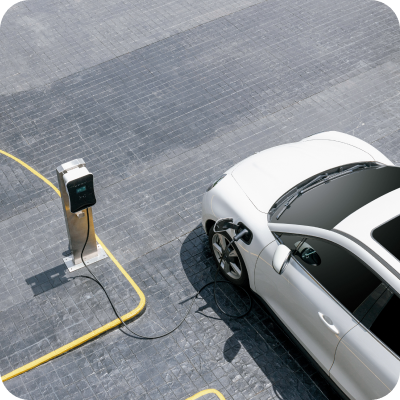OCPP vs OCPI – how they can create a seamless user experience in EV industry

In 2020, only 2.2% of all cars in the United States were electric. Two years later, and already 6.1% of vehicles on American roads are electric. Globally, 1 in 7 cars sold is an EV! The number of EV cars sold could be growing even faster if not for the fact that charging the EV cars on the road still might be a bit problematic. And we are not talking here about there not being enough CPO stations available – the EV drivers charging experience also needs to be improved.
This is where OCPI (Open Charge Point Interface) and OCPP (Open Charge Point Protocol) come into play. These two technologies have revolutionized how EV charging networks can communicate with one another, and soon, they might become an integral part of the EV industry.
So in this blog post, we’ll take a closer look at how OCPI and OCPP are helping to boost the overall experience of EV business owners and EV drivers, and why they are becoming increasingly vital to the growth and success of the EV industry.
What is the Open Charge Point Protocol or OCPP?
The EV industry has developed several useful protocols in the last few years, both to help EV business owners manage their charging networks and infrastructure but also to make the experience of electric vehicle drivers more pleasant. For example, Open Smart Charging Protocol (OSCP) lets the charge point operators know what is the accessible capacity of an electricity grid at the moment.
The true revolution came with OCPP and OCPI though, as those can solve the problems that were plaguing the industry for a while. Let’s start with explaing what OCPP protocol is.
The Open Charge Point Protocol (OCPP) is an open-source communication protocol meant to let different hardware, software, networks and service providers easily communicate with each other. It was developed by the Open Charge Alliance in 2009, with the latest protocol version being 2.01.
The reason why they created this protocol is simple. Until now, many EV software and hardware devices were using their own network and communication protocol that only allowed them to communicate with specific types of equipment.

That forced the EV business owners to check whether the new EV software they want to use is compatible with their hardware or vice versa. Otherwise, those systems wouldn’t be able to exchange information, and the owners would have to manage each of them separately.
So if, let’s say, a charge point operator wanted to replace the charge point management system they were currently using, they needed to verify whether the new central management system can even work with their existing infrastructure. As a result, businesses had few options for modernizing their stations.
OCPP aims to solve the problem by using a single protocol “language” through which different devices, systems, and service providers could exchange information between themselves. In simple terms, any OCPP-compliant charging station can use any software or hardware that supports OCPP standards.
The latest available version of OCPP is 2.01, released in 2020. As 2.01 is still being rolled out, most OCPP-compliant stations still use OCPP 1.6 and will gradually upgrade to 2.01 in the future.
Why should EV company owners be interested in implementing OCPP?
Over 220 companies belong to the Open Charge Alliance – from equipment manufacturers, software, and systems providers to charging network operators. Why? Because there’s a lot to be gained from implementing the OCPP protocol – both for the EV charging industry and their customers.
The biggest benefit is the flexibility you can gain by implementing OCPP.
As we mentioned above, upgrading or replacing parts of the EV infrastructure is still quite tricky because business owners must first make sure that the new parts can work together with the software they are using. And with the communication protocols and supported equipment list varying from a vendor to vendor, business owners were often forced to use only software/equipment from one vendor/manufacturer.
OCPP gives company owners far more flexibility here. As long as the hardware and software are OCCP-compliant, you can choose any EV platform or equipment that meets your needs the most. But what’s even better is that you can switch the software you are using or replace the charging equipment without having to worry about compatibility issues.

So, for example, if your charging station outgrew the energy management system you are currently using, you can pick any available OCPP-compatible solutions and move your station to those.

Besides the flexibility, OCPP can also bring to your electromobility business:
- Versatility – Since the entire OCPP protocol is open-source, you can modify the code to fit your needs, for example, to add support for specific billing methods.
- Multiple useful features – OCPP comes with device management, load balancing, transaction processing, and smart charging features. Through those, business owners can, for example, remotely start and stop charging sessions or adjust the charging prices in real-time.
- Security – To protect communications between charging stations and back-office systems, OCPP protocol uses industry-standard security protocols, such as TLS encryption. That way, sensitive data, such as customer information and transaction information, is fully protected from unauthorized access.
- Cost Savings – With OCPP standard, business owners to change their equipment or software as needed, without modifying or replacing parts of their infrastructure just to make the entire system work smoothly. That makes upgrading the infrastructure is smoother but also cheaper for the owners. The protocol can also help business owners to save money by giving them plenty of data through which they can use their infrastructure more efficiently and this way, reduce their maintenance and utility costs.
- Better user experience – OCPP also helps in giving EV drivers a better experience. For example, providing real-time information on charging stations’ availability and prices can help customers plan their trips more efficiently. Additionally, the protocol supports different billing models so that stations can offer flexible billing options. OCPP 2.0 also supports Plug&Charge technology, through which EV drivers can charge their cars simply by plugging them into smart charging stations without any additional authentication.
What is the Open Charge Point Interface or OCPI?
The second essential protocol for the EV industry nowadays is Open Charge Point Interface or OCPI in short.
Open Charge Point Interface (OCPI) is a protocol developed by eViolin, an association of Dutch charge point operators and mobility service providers, and ElaadNL, the national grid operator group. Now the protocol is maintained by the EVRoaming Foundation and available for free.
The OCPP and OCPI acronyms may sound very similar, but they serve entirely different purposes. OCPP aims to connect various EV equipment, software platforms and services through a single communication protocol.
OCPI meanwhile is used for connecting various ev charging networks, charge station operators and service providers (for example, a charging app provider). The protocol ensures that both charging stations and the service providers can exchange information about the station’s location, chargers accessibility, pricing options, and electric vehicles drives, allowing the customers to charge at any station they want.
The latest available version of OCPI is 2.2.1, released in July 2022.
Why should EV company owners be interested in implementing OCPI?
The key benefit of OCPI is that it gives EV drivers access to a much wider range of charging stations. As we all know, “range anxiety” is one of the main things that make people wary of EV vehicles – no one wants to be suddenly left with an empty battery without any charge points in sight. And while the number of chargers is growing fast, there is still one more problem to tackle.
Namely, many of those stations have different charger types, prices, payment options, and customer authentication requirements. So it unfortunately still happens quite often that when an EV driver does find an available charging station, it doesn’t have the billing option they are regularly using or the connector that would fit their car.
Another problem is that different stations also often require the drivers to have a customer account before they can start charging. What if the drivers can’t find an available station of their primary provider? Then they might need to create an entirely new customer account just to be able to charge at a different station.
A lot of hassle for one-time charging, right?

OCPI can make this far easier, as EV drivers can charge at any OCPI-enabled station without needing an additional customer account. All they will need is a dedicated roaming app through which they can check available charging stations in a given location, what charger and connector types the stations use, and also what are the prices there.
Then they can reserve a place at the station and even automatically pay for the charging straight from the app. The invoice and the charging data will then be automatically sent to their main customer account.
As a result, charging an EV car becomes so much easier. Rather than worry about finding an available station on the road, they can check the available charging points in a given place right inside the app and plan their travel accordingly. They won’t need several customer accounts or RFID cars either – the roaming mobile app will automatically send the customer information to the charging station.
All information related to the charging itself (time, price, charging status, available discounts, etc.) will also be inside the app – so the drivers will have all the data they need in one place, rather than in several apps.
How can Codibly help you implement OCPP and OCPI protocols in your company?
Do you want to take advantage of the OCPP and OCPI protocol and boost your drivers’ experience as well? Then how about reaching out to us at Codibly to help you implement it?
We have created two dedicated microservices with which implementing both protocols is much faster:
- Dedicated OCPP Server
- OCPI Adapter
We actually used the first microservice to help IoTecha implement OCPP 1.6 in their company – and finished the implementation in just one month. So if you want to implement either of the protocols or maybe both of them in your company, then our microservices will definitely come in handy.
Reach out to us with your OCPP/OCPI implementation needs, and we’ll be happy to share the microservices and our experience with you.
Conclusion
OCPP and OCPI aren’t yet seen as international standards and as such, aren’t widely used in the EV industry yet. With how many benefits those protocols can bring to EV company owners and to EV drivers though, this is probably just a matter of time.
OCPP can give business owners far more flexibility when choosing the right hardware and software for their needs and also makes managing the entire infrastructure much easier.
OCPI meanwhile will tremendously boost driver experience by letting them use multiple networks for their charging needs, rather than have to search for one specific charging station brand.
With our skills and ready microservices, we can help your company implement both of those protocols. So you are aiming to make your EV company more efficient and driver-friendly, those protocols and our experience might be exactly the thing you need.

contact us
Need expert guidance on your next energy project?
Reach out to us and discover how Codibly can offer tailored solutions to drive your business.